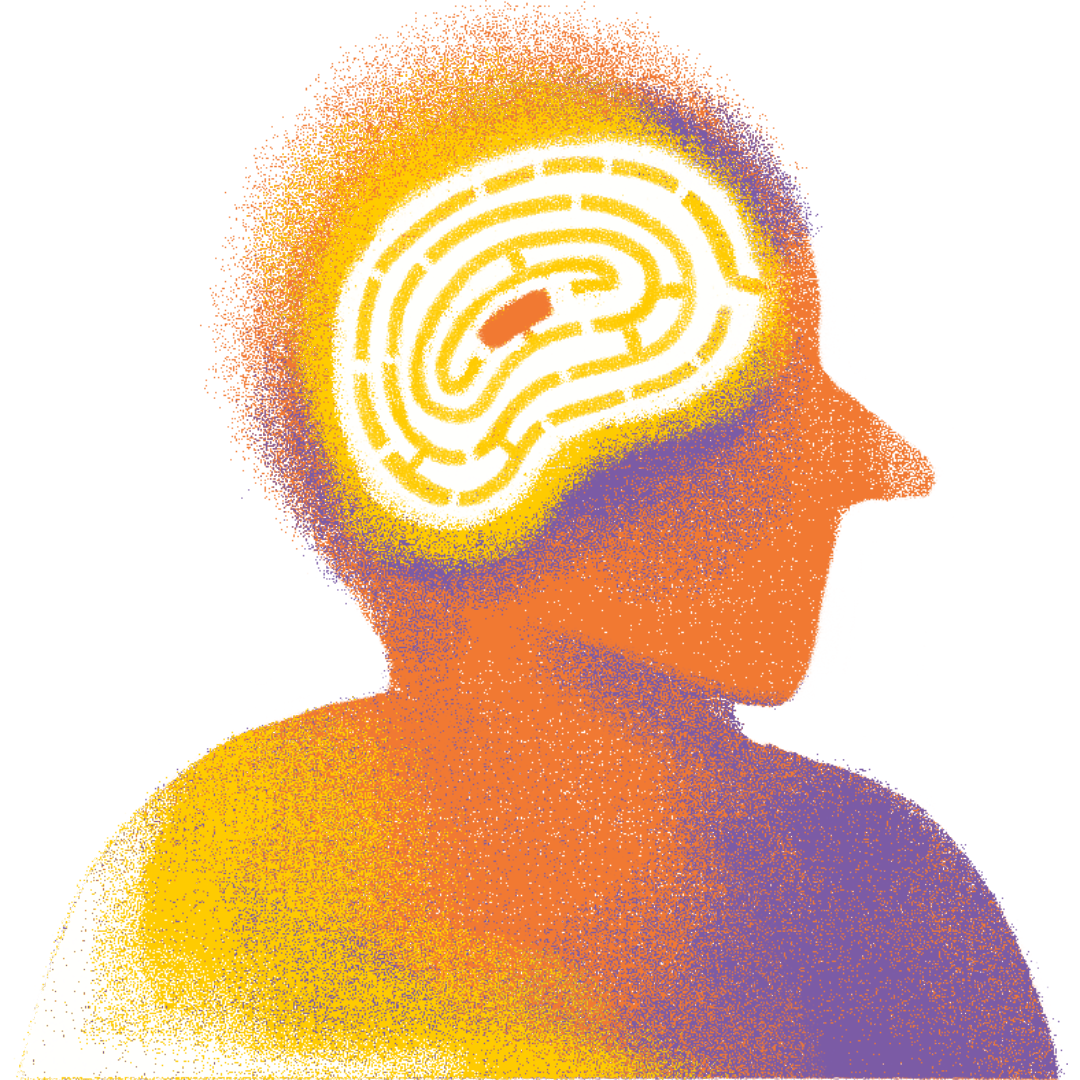Let’s be honest. Ever have one of those moments where you know exactly what you should do – hit the gym, eat the salad, finally start that project, bite your tongue in that argument – But sometimes, your brain acts like a little kid having a big meltdown! “Nope! Not happening! Let’s scroll social media/eat the cake/procrastinate/vent instead!” Yeah. Me too. Over coffee, my friend, we’ve all been there.
It’s like there’s this constant tug-of-war inside us, right? The logical part whispers wisdom (that’s our intellect, our buddhi), and the impulsive, feeling-driven part (our man, the mind) just wants instant gratification, comfort, or distraction. We know procrastination hurts us, but we do it. We aware that certain foods aren’t great, but we crave them. Every one of us know that reacting in anger rarely helps, but we explode.
Why is the gap between knowing and doing so darn wide? And more importantly, how do we bridge it to find some actual peace? That’s what we’re unpacking today, cup of coffee in hand. Let’s talk about the mind.
The River and the Rocks: Why Change Feels Impossible
Imagine your life as a flowing river. Smooth, constant, moving forward. Now, picture deep-seated habits, fears, and ingrained patterns as rocks beneath the surface. When the water (your daily actions and thoughts) hits these rocks, turbulence happens – stress, bad decisions, procrastination, anger. That’s your mind reacting based on years of conditioning.
Trying to force a massive change overnight is like trying to draw a permanent line on that flowing water. Pointless. The water just erases it. The real work? It’s not about controlling the surface flow, but gradually shifting those rocks underneath – those deep-seated patterns within the mind.

Mind vs. Intellect: Who’s Really Driving the Bus?
This is crucial. We often confuse the two:
- The Mind (Man): This is the feeling, wanting, craving, fearing part. It’s powerful, reactive, and seeks pleasure/avoids pain right now, regardless of consequences. It’s like the excitable kid in the back seat yelling “Ice cream! Faster! Turn here!” Its fuel? Experiences, especially pleasurable or dramatic ones. It loves distraction, drama, and instant hits.
- The Intellect (Buddhi): This is the discerning, understanding, wise part. It sees the bigger picture, understands cause and effect (“If I eat this, I’ll feel sluggish; if I yell, I’ll regret it”). Its fuel? Right knowledge, deep understanding, and clarity. It’s the calm adult driving, considering the destination, the traffic rules, and the well-being of everyone in the car.
The problem? For most of us, the mind is often in the driver’s seat, blasting the radio and ignoring the map. The intellect might whisper directions, but it gets drowned out. We react instead of respond.
Here’s a quick comparison:
| Aspect | The Mind (Man) | The Intellect (Buddhi) |
|---|---|---|
| Primary Drive | Pleasure, Avoidance of Pain (Immediate) | Understanding, Discernment, Long-term Well-being |
| Fuel | Experiences (Especially Intense/Dramatic) | Right Knowledge, Deep Understanding, Clarity |
| Focus | Right Now, Sensations, Feelings | Big Picture, Cause & Effect, Consequences |
| Strength Source | Repetition of Experiences (Good or Bad) | Cultivation of Wisdom & Right Thinking |
| Reaction | Impulsive, Emotional, Craving-based | Considered, Calm, Choice-based |
| Goal | Immediate Gratification, Excitement | Sustainable Peace, Right Action, Balance |
So, How Do We Strengthen the Driver (Your Intellect)?
Okay, theory is great over coffee, but how do we actually make our intellect stronger so it can gently but firmly guide the mind? It’s not about brute force. It’s about cultivation:
- Feed it Right Knowledge (The Good Stuff): Just like the mind craves junk experiences, the intellect thrives on wholesome input. Seek out information that brings clarity, not chaos. Read insightful books , listen to wise talks (like the one that inspired this post!), engage in conversations that make you think, not just react. Be mindful of the “junk food” you feed your intellect – constant news cycles, gossip, mindless scrolling, sensational content. That stuff weakens it. As the reference insightfully noted, constantly feeding the mind drama makes it crave more drama, starving the intellect.
- Go Beyond Surface Knowing to Deep Understanding: Knowing sugar is bad is surface level. Understanding how it spikes your blood sugar, crashes your energy, affects your mood, and impacts long-term health – that’s deeper. When you truly grasp the “why” behind something – why a habit harms you, why a reaction backfires, why a choice leads to peace – that understanding becomes a powerful motivator that speaks louder than the mind’s fleeting cravings. Ask “Why?” more often. Dig deeper.
- Practice Seeing Reality Clearly (Especially in the Moment): This is gold. When the mind throws a fit – craving that cake, wanting to lash out, screaming procrastination – pause. Don’t fight the feeling head-on (that often makes it stronger!). Instead, bring in the intellect. Ask calmly:
- “What is this feeling really? Just a sensation?” (Like noticing the fear before the dentist, not just the pain).
- “What will actually happen if I give in? What are the real consequences?” (Go beyond the immediate “Yum!” to the sluggishness, guilt, or health impact).
- “What’s the wiser choice here, aligned with my deeper well-being?”
- “Is this situation worth my intense reaction? What’s the bigger picture?”
This isn’t suppression; it’s conscious discernment. It’s the intellect observing the mind’s storm without getting swept away.

- Start SMALL and Be Consistent (Shifting Pebbles, Not Boulders): Remember those rocks in the river? Trying to change everything at once is overwhelming and usually fails, leaving the mind triumphant and you discouraged. Instead, focus on tiny, sustainable shifts where intellect guides action:
- Swap one unhealthy snack for a better option consistently, understanding why.
- Pause for 3 deep breaths before reacting in a minor frustration.
- Dedicate just 10 focused minutes to a task you dread, knowing starting is the hardest part.
Each small victory, each time intellect wins over the mind’s impulse, strengthens the intellect. It’s like chipping away at those rocks. Over time, these small changes rewire your responses. As mentioned, forcing major dietary overhauls often backfires because the mind rebels violently. Minor, intelligent tweaks work.
- Find the Joy in the “Right”: The mind thinks joy only comes from the cake, the scroll, the outburst. Your intellect, once strengthened, discovers a deeper, more sustainable joy. It finds satisfaction in acting with integrity, in choosing health, in completing a task, in responding calmly. Notice that quiet pride when you don’t give in to the impulse? That’s the intellect’s joy. Cultivate that. It becomes a powerful motivator, far stronger than fleeting pleasure.
The Secret Weapon: Finding Peace in the Neutral (The Sound of Silence)
Here’s a profound insight from the discussion: Most of life isn’t extreme highs or lows. It’s neutral. But the mind hates neutral! It constantly seeks the next hit of pleasure or drama, or dreads the next pain. This constant chasing/avoiding is the source of stress.
The real peace? It’s learning to be content, even joyful, in that neutral space – the quiet hum beneath the mind’s chatter. It’s the “Sound of Silence” – that background awareness that’s always there, stable and untouched by the passing storms of thought and emotion.
How do you touch this?
- Observe the Gap: Between stimulus and response, there’s a space. Practice widening it with that pause we talked about. In that pause, before the mind reacts, there’s stillness.
- Notice the Neutral: Several times a day, just stop. Notice your breath. Notice the silence between sounds. Notice the simple fact of being aware. Don’t judge it as boring; just observe it. This is the stable “water,” not the turbulent waves caused by the rocks (the mind’s habits).
- Understand Your True Nature: This gets deep, but the analogy used was powerful: We are like actors playing roles (parent, employee, friend), but we mistakenly believe we are the role. When the role faces problems (job loss, argument), the actor suffers intensely. But the actor isn’t the role. There’s a stable awareness behind all the roles and dramas of the mind. Connecting with that – the silent observer, the awareness itself – is the source of unshakeable peace. It’s realizing you are the vast, calm ocean, not just the turbulent wave. This understanding, deeply absorbed by the intellect, fundamentally changes your relationship with life’s ups and downs.

It’s a Journey, Not a Quick Fix (Be Kind to Yourself)
Taming the mind and strengthening the intellect isn’t about becoming a robot. It’s about shifting the balance of power within yourself. Some days the mind will win. That’s okay. It’s practiced for years! The key is awareness and gently bringing the intellect back online.
Don’t get mad at your thoughts—try to understand them. Don’t push away your feelings—just notice them. Don’t try to change everything in one day—take small, smart steps.
The reward? Less inner conflict. Better decisions. More resilience. Less stress reacting to life’s turbulence. And ultimately, a deep, abiding sense of peace that isn’t dependent on external circumstances – a peace found in mastering your own inner world, the mind included.
What about you? Where do you feel that tug-of-war between knowing and doing most strongly? What’s one tiny “rock” you could start gently shifting this week? Share your thoughts or struggles in the comments below – let’s learn from each other! And if this resonated, explore more ways to cultivate inner peace The Secret Sauce Nobody Told You About: Why “The Practicing Mind” Changes Everything or dive deeper into understanding habits Habit Formation. Here’s to a calmer, more centered you! ☕




qo6zl2
kx3p9b
Alrighty, let’s see… 999betcc. Worth a look! Pretty simple to get started and they seem to have a lot going on! Just remember to keep it light and fun, alright? 999betcc
Heard some buzz about kingjl. Decided to check it out myself. Not bad, not amazing. What’s everyone else’s take on this one?
Ey yo, found the kingjltelegram channel. Anyone in there? Is it worth joining for tips and tricks or just a bunch of spam?
Jili99login, keeping it simple with the login, I see! Getting in is easy, and they have a solid variety of Jili games. Makes sense to check it out! Go to jili99login.
Kwinvn… hmm, not bad so far! Easy to navigate, which is a big plus for me. If you search it, find it in kwinvn.
Alright, just had a look at jl7bet.net. Good looking site and a decent range of games. Anyone else tried it? Pretty standard betting site, but it might have what you’re looking for. Take a look for yourself: jl7bet
Hey guys wanna feel like a VIP player? Well, check out ho88vip.com. It’s just another one of those gaming sites. Looks clean, but it’s got nothing too special. Feel like a VIP when you click here: ho88vip